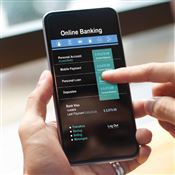How to Switch Banks
Ad Disclosure: This article contains references to products from our partners. We may receive compensation if you apply or shop through links in our content. This compensation may impact how and where products appear on this site. You help support CreditDonkey by using our links.
Switching banks or credit unions isn't complicated. But, there are several things you have to do first. Read to find out.
 |
Here's how to move your deposit account to another bank.
Does your current bank no longer spark joy?
Whether it's an unpleasant experience or a tempting offer from another financial institution, perhaps it's time for a change.
Learn the simple steps to switching banks/credit unions and how to make sure you don't regret it.
Opening a new bank account usually only takes a day. However, the process of transferring recurring deposits and transactions to your new account can take at least a month or 1 billing cycle.
Why People Decide to Switch Banks
Below is a table showing different reasons for switching banks/credit unions.
| % | Reason |
| 35% | Wants a change[1] |
| 31% | Current bank's charges are too high[2] |
| 15% | Events indirectly related to their finances[1] |
| 15% | Prioritizes good rates[1] |
| 13% | Wants better online access[1] |
| 11% | Attractive signup bonus[1] |
| 9% | Wants better customer support[1] |
How to Switch to a New Bank?
Switching banks/credit unions can be a straightforward process. If you plan it carefully and strategically, you can avoid dreaded scenarios of missed payments, overdraft fees, and lost deposits.
Below are 6 steps to take if you decide to transfer your account to another bank.
Pick A New Bank/Credit union
The goal is not just to find a bank but a better one.
Look for a bank that offers services, fees, and features aligning with your financial needs and goals. You should also compare interest rates, account options, online banking capabilities, and branch locations (if planning to move to a brick-and-mortar bank).
Bank of America Advantage Banking - Up to $500 Cash Offer
- The cash offer up to $500 is an online only offer and must be opened through the Bank of America promotional page.
- The offer is for new checking customers only.
- Offer expires 05/31/2026.
- To qualify, open a new eligible Bank of America Advantage Banking account through the promotional page and set up and receive Qualifying Direct Deposits* into that new eligible account within 90 days of account opening. Your cash bonus amount will be based on the total amount of your Qualifying Direct Deposits received in the first 90 days.
Cash Bonus Total Qualifying Direct Deposits $100 $2,000 $300 $5,000 $500 $10,000+ - If all requirements are met 90 days after account opening, Bank of America will attempt to deposit your bonus into your new eligible account within 60 days.
- Bank of America Advantage SafeBalance Banking® for Family Banking accounts are not eligible for this offer.
- Additional terms and conditions apply. See offer page for more details.
- *A Qualifying Direct Deposit is a direct deposit of regular monthly income – such as your salary, pension or Social Security benefits, which are made by your employer or other payer – using account and routing numbers that you provide to them.
- Bank of America, N.A. Member FDIC.
HSBC Premier - Earn Up to $7,000
- Send and receive money with Zelle® right from our mobile app
- Manage your money safely, easily and fee-free around the world - from Global Money Transfers to multi-currency needs
- Enjoy peace of mind with unique travel benefits available through our credit cards
Here's how the offer works: Open a new HSBC Premier checking account by March 31, 2026. Add New Assets to your Premier checking account, Premier Savings account, Premier Relationship Savings account, Managed Portfolio Account and/or Spectrum account (Eligible Accounts) by March 31, 2026, and maintain the New Assets through June 30, 2026.
- Get a $1,500 Cash Bonus: Add and maintain New Assets of $150,000 to $249,999
- Get a $2,500 Cash Bonus: Add and maintain New Assets of $250,000 to $499,999
- Get a $3,500 Cash Bonus: Add and maintain New Assets of $500,000 to $999,999
- Get a $7,000 Cash Bonus: Add and maintain New Assets of $1,000,000+
If all offer requirements are met, the bonus will be paid by August 31, 2026.
Chase Total Checking® - $400 Bonus
- New Chase checking customers can receive $400 when you open a Chase Total Checking® account and make direct deposits totaling $1,000 or more within 90 days of coupon enrollment.
- Unlock more offers with Chase. Get up to $500 per calendar year by referring friends and family. Plus, get cash back from top brands with Chase Offers when you use your debit card.
- Chase Total Checking® has a $15 monthly service fee, you can easily avoid the fee with direct deposits totaling $500 or more, or a minimum average daily balance each statement period.
- Chase Overdraft Assist℠ – no overdraft fees if you're overdrawn by $50 or less at the end of the business day or if you're overdrawn by more than $50 and bring your account balance to overdrawn by $50 or less at the end of the next business day*
- Chase Mobile® app makes banking simple. Manage accounts, pay bills, send money to friends with Zelle® and deposit checks on the go with Chase Quick Deposit℠.
- Chase has the largest branch network in the U.S. with thousands of ATMs and branches. Use the Chase locator tool to find a branch or ATM near you.
- Chase helps keep your money protected with features like Zero Liability Protection, fraud monitoring and card lock.
- Chase Total Checking includes FDIC insurance up to the maximum amount allowed by law.
If you like writing paper checks, you might want to skip on an online bank. It usually provides only debit cards in its checking account option.
For better earnings, don't limit yourself to traditional bank types and account options. Consider opening high-interest savings accounts, CDs, money market accounts, or cash management accounts in fintech companies and mobile investing platforms.
Remember, you don't have to open them all in one bank. Having multiple financial institutions can spread out your risk and increase your FDIC coverage.
List Recurring/Automatic Transactions
Thinking about the recurring payments for bills and subscriptions you have to transfer from your current bank can be stressful.
Take a proactive approach and make a list of all your recurring transactions (as shown below), noting their due dates, and relevant contact info of their service providers.
- Automatic bill payments: electricity, water, internet, water
- Automatic direct deposits: paycheck, pension, tax refunds
- Recurring transfers and payments: transfers to linked accounts i.e. savings and investment accounts, child-support payments
Check your statements in the last 12 months to ensure that you won't miss any during your transition to a new bank.
Additionally, if your current bank account has rewards, use them up so you don't forfeit them when you eventually close your account.
Yes, you can switch banks even when you are going through a divorce. Assuming you have a joint savings account, it is better to close it first (which your spouse must agree to) and open an individual account in your chosen bank thereafter. In any case, consult a legal professional to help you navigate the complexities and protect your financial interests.
Open Your New Account
Most banks/credit unions will allow you to open a bank account online or in person. To ensure a smooth process, come prepared with necessary requirements and information.
They usually ask for the following:
- Personal information (e.g., name, date of birth)
- Contact information (e.g., email, phone number, residential address)
- Social Security Number (SSN) or Employer Identification Number (EIN)
- Government ID (e.g., driver's license or state ID card)
You can also set up online and mobile banking right away. Do test transactions to see if everything works and activate alerts according to your preference.
Switching banks is typically not so complicated, especially since some banks allow you to do everything online. However, it can require some legwork on your part if you have a lot of transactions that rely on your account.
Redirect Your Direct Deposits and Automatic Transactions
Advise your employer, billers, and payors to update your banking information with your new account details for future transactions. However, do this first — review which subscriptions you want to keep and the ones that you can cut off.
There are online budgeting tools that can identify subscriptions you may have forgotten about and cancel those that are unused.
Once you've listed all your recurring transactions, here's how to go about them.
For subscriptions
- Go to your account page on your biller/provider website.
- Check for option to change your payment method.
- Replace account info with new one and Save/Submit.
- Go to your payment method again to double check if your details are updated.
- Call your biller's customer hotline in case you are unable to update it online.
For paychecks
- Contact your HR.
- Submit a request by filling out a form online or in person.
- Provide your new bank details.
For Social Security benefits
- Log into the Social Security website.
- Edit your bank details.
- Call +1 800-772-1213 (if unable to update via website)[3]
Sort out any postdated checks you have issued as well by providing alternative payments to those involved. This may entail ordering new checks or opening a safety deposit box with your new bank. Doing these will help avoid penalties arising from delays in receiving or making payments.
Transfer Remaining Funds From Your Previous Account
You can empty out your old account by doing any of the following:
- Withdraw cash at a branch or ATM
- Transfer electronically to your new account
- Request a check from your bank/credit union
Transfer remaining funds only after all automatic transactions have been switched to your new account. This could take a month or two based on the timing of your change.
You can switch banks even if you have an existing loan with the bank (unless your loan agreement prohibits you from doing so). That said, some loans may have been granted under the condition of keeping your deposit account with the same bank.
Close Your Old Account
Make sure to close your account immediately after you've transferred all the remaining money in it. Otherwise, your bank will charge you a monthly fee if your balance falls below their minimum requirement.
On the other hand, keep your old bank account open if it does not have a minimum balance. This will enable you to check if your direct deposits and recurring transactions are no longer coming through.
Additionally, check with the bank for any closing or early account closure fees, and settle them accordingly. Safely dispose of your debit card and remaining paper checks to prevent fraudulent transactions.
When Should You Switch Banks?
Generally, you may move from one bank to another when your current bank is unable to meet your financial needs and goals. Here are some of them:
- Better Interest Rates
If you are coming from a traditional bank, you might be tempted by the higher APYs of online banks. This may be worth considering if you tend to keep high balances that grow at a snail's pace in your current bank. - Less Fees
Many banks/credit unions have free checking options, which can be helpful if you want to save on fees. Others either waive incidental charges or have lower fees on excess withdrawals, overdrafts, out-of-network ATM use, etc. - Attractive Perks
Banks may offer sign-up bonuses from time to time, which can be anywhere from $100 to $500 for regular checking accounts. This extra cash may boost your funds, pay toward minor debts, or cover small expenses. - Relocation
If your account is with a regional bank, it may not be available in your new location. Thus, you'll have to find a new bank with a nearby branch or explore online banks if you haven't. - Unsatisfactory Service
Frequent runaround treatment, like poor online banking service or security issues, can be a dealbreaker, pushing account holders to seek better options.
Although your current bank may have fallen short of your expectations, don't be too rash in your decision without reading the next section.
Generally, switching banks won't really affect your credit. As long as you don't leave unpaid balances on credit products, like loans and credit cards, then you should be fine.
However, do note that activity involving bank accounts or deposit products is tracked by the ChexSystems instead. Your bank prospect may run your ChexSystems report to determine if they will approve your account opening or not.
Tips To Land the Right Bank
Since you are set to move your account to another bank, you don't want to regret that decision. These tips may help you get it right:
- Consider a better account option first.
Perhaps your current bank has other accounts that could work better for you. For example, if you are annoyed by fees, they might have a free checking option that could save you $10 to $20 each month.Discuss your options with your bank's relationship manager before considering a switch.
- Do your research.
Bank reviews and input from family or friends who use the bank you're considering are valuable. If many customers share a concerning issue, continue searching for other banks. - Look at other bank types.
If you're unsatisfied with major banks, consider smaller banks or credit unions. These types of financial institutions may offer more personalized services, avoiding another big bank switch. Non-banks like fintechs and mobile trading apps are great alternatives if you prioritize better rates. - Call your potential bank.
Banks may make an extra effort to impress potential clients. Test their customer support by assessing response time, efficiency, and available options. Visit their physical branch, if available, for a more in-depth experience. - Make sure it's covered by insurance.
Although most financial institutions are insured either by the FDIC or NCUA, always check if the bank you're moving to is. Note, however, that these insurance agencies only cover up to $250,000 of your deposit balance if the bank were to go under.[4][5]
FAQs
Can you switch banks without closing an account?
If you don't plan to use the old account anymore, you must close it since the bank may not automatically do so. They may even continue to charge monthly fees. However, you can keep your old and new accounts as long as you can manage having both.
Which banks give you money for switching?
Several banks, like Bank of America and Chase, entice you to switch to them by offering attractive sign-up bonuses. However, their promotions are often limited-time offers. So if you see one that matches your banking needs, grab it before it's gone.
Do you get all your money when closing a bank account?
You can withdraw all your remaining funds before you close your account. But even after closure, the bank is legally required to return any money left in your account after deducting any applicable fees. They usually send it back by mailing a check.
What the Experts Say
CreditDonkey asked a panel of industry experts to answer readers' most pressing questions. Here's what they said:
Bottom Line
Switching banks/credit unions is a big financial move that can help you improve how you manage your finances. It can even bring you better banking opportunities in the long run.
But, remember to think this through before making the move. Look at the benefits of your potential bank, such as lower fees, better customer support, or higher interest, so it becomes a good decision.
May this endeavor take you to greater financial success and peace of mind!
References
- ^ Yahoo Finance. Here's Why 1 in 5 Americans Are Considering Switching Banks, Retrieved 12/04/2023
- ^ GlobeNewswire. Nearly a Quarter of Consumers Are Likely to Switch Banks.., Retrieved 12/04/2023
- ^ Social Security Administration. Update Direct Deposit, Retrieved 2/19/2024
- ^ FDIC. Your Insured Deposits, Retrieved 11/06/2023
- ^ NCUA. How Your Accounts are Federally Insured, Retrieved 11/06/2023
Write to Penelope Besana at feedback@creditdonkey.com. Follow us on Twitter and Facebook for our latest posts.
Note: This website is made possible through financial relationships with some of the products and services mentioned on this site. We may receive compensation if you shop through links in our content. You do not have to use our links, but you help support CreditDonkey if you do.
|
|
|







